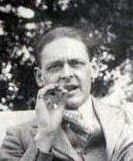The Waste Land and Other Poems by T.S. Eliot
Page 2 of 19 - 1 2 3 4 5 6 7 8 9 10 11 12 13 14 15 16 17 18 19 Purchase full notes for £5.95 (aprox $9.28)
Behind this compelling image is undoubtedly a very personal desire to make poetry an ‘escape from emotion’ as Eliot puts it later in this essay. The idea that the human being can somehow ‘disappear’ from his creative work, however, is difficult to accept completely, even though Eliot’s notion was very influential. His own poetry though is, rather obviously, a poetry of personal pain, and his work’s obliqueness and evasiveness often only serves to emphasise this.
Eliot’s work constantly returns to the same essential emotional background. While only a handful of lines could be termed autobiographical, it is hard to accept his ‘invisibility’ as a poet, given that he writes so powerfully about failure in relationships over and over again. In fact, his ‘escape from emotion’ was triumphantly unsuccessful, and the great poetry he produced is testimony to this.
The two key themes of Eliot’s work up until The Hollow Men (and, in many ways, including that poem too) are really the same theme at root, but they can be conveniently distinguished under the titles of ‘failing to relate to others’ and ‘facing the ordeal.’ Eliot’s characters are isolated, solitary voices, whose personalities, as a result, can sometimes seem rather diaphanous. Prufrock, for example, is more of a ‘fog’ of consciousness that a recognisable mind, engaged in a fencing competition between the side of himself that wishes to express his emotions and the side that is paralysed by a desperate fear of what the consequences will be for him if he does. He is right to be afraid, of course. Eliot makes it quite clear that his romantic aspirations are hopeless fantasies – indeed a fantasy world is all he has.
Prufrock is closely related in this respect to Rhapsody on a Windy Night , which does not foreground the relationship theme, but rather presents an escape from the whole of diurnal life into the world of the subconscious. The fears and longings that are suppressed, though, become all too evident when the subconscious mind is released: a prostitute eyes up the speaker; he identifies obsessively with the broken, twisted and discarded; he is both fascinated and repulsed by minds which operate by a kind of animalistic automatism; finally, the moon becomes a senile old woman, half-remembering the amours of her past. The loss of personality in such a ‘fog’ is reminiscent of Prufrock, and of the speaker of Portrait of a Lady , who longs for a ‘tobacco trance.’

